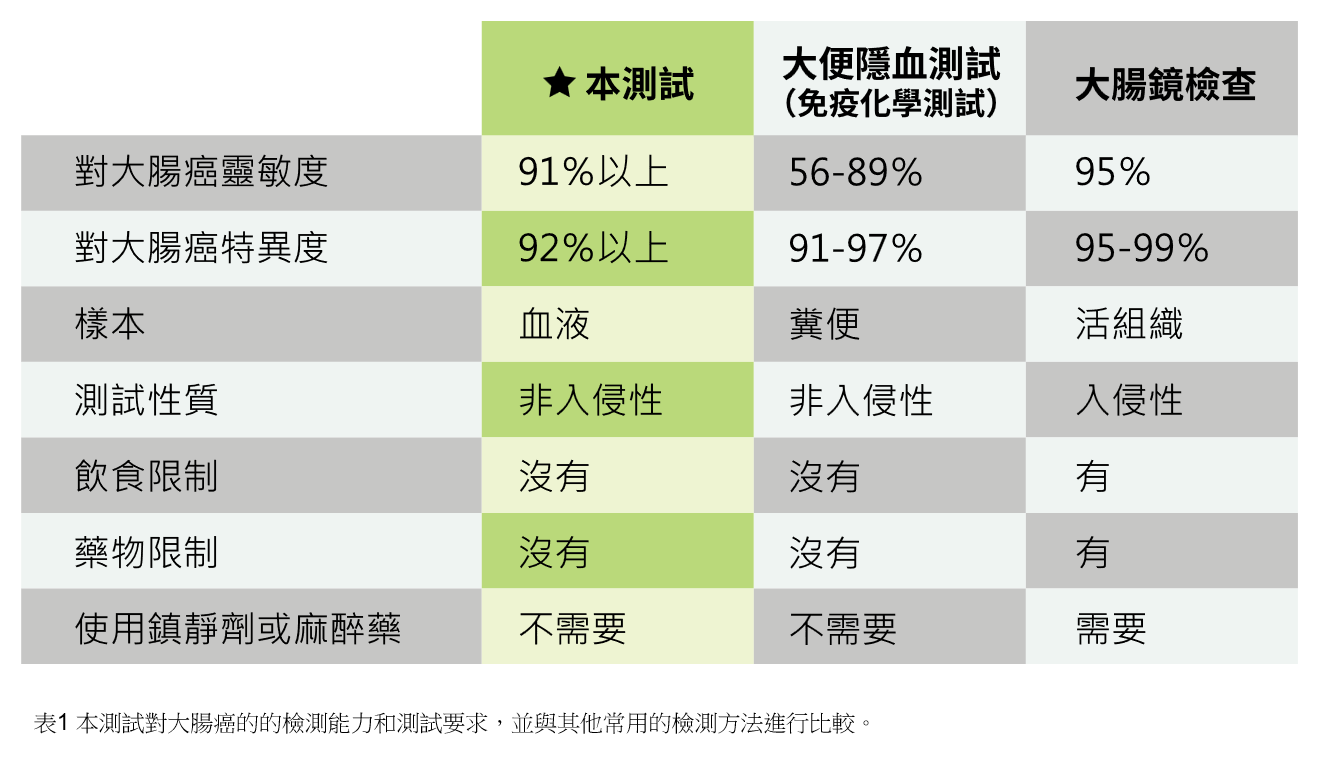什麼是大腸癌?
大腸癌位列香港常見癌症的第三位,而死亡率亦高踞第二位,於2023年導致2266人離世,佔癌症死亡個案的15.2%1。大腸癌發病的年齡中位數為69歲2,而近年香港55歲或以下人士的發病率持續上升3。根據美國癌症協會於2018年公布的大腸癌篩查指引,45歲或以上人士應該定期接受大腸癌篩查4。而有大腸癌家族史、患有遺傳性腸病或其他已知增加患上大腸癌風險的人士應該更早開始進行定期篩查5。
大腸癌的風險因素5,6
| 不良生活習慣(缺乏運動、多吃紅肉和加工肉類、少吃高纖維食物、喝酒、吸煙等) |
| 遺傳性腸病家族史(連氏綜合症和家族性大腸腺息肉病等) |
| 有一名*直系親屬於60歲或之前確診大腸癌 |
| 有兩名或以上不論年齡的*直系親屬確診大腸癌 |
| 曾有大腸息肉 |
| 大腸長期發炎(例如潰瘍性結腸炎) |
*直系親屬為父母、兄弟姊妹和兒女
病徵
早期的大腸癌可以毫無徵狀7,以下為大腸癌的常見徵狀6,7:
| 大便帶血或帶黏液,或直腸出血 |
| 排便習慣改變,例如持續便秘或腹瀉,糞便形狀變為幼條狀 |
| 大便時有尚未排清的感覺 |
| 體重無故下降 |
| 腹痛、脹氣或腹部抽筋 |
| 身體出現貧血徵狀(疲倦和氣喘等) |
檢測方法
傳統的大腸癌檢測方法包括大便隱血測試和大腸鏡檢查。大便隱血測試分為愈創木脂測試(gFOBT)和免疫化學測試(iFOBT或FIT),當中iFOBT因沒有飲食限制和對大腸癌有較高靈敏度而被視為大便隱血測試的改良版8,9。然而,當受測者有因胃潰瘍或痔瘡等原因引起的出血,測試結果亦有機會為陽性,導致假陽性個案9。同時,如果受測者的腫瘤或息肉沒有出血就可能出現陰性結果,即為假陰性個案9。
香港政府於2020年推行大腸癌篩查計劃,為50至75歲適合接受大腸鏡檢查的香港居民提供iFOBT作免費的大便隱血測試,測試結果為陽性的受測者可以接受由政府資助的大腸鏡檢查以作跟進10。截至2024年年底,超過510000位合資格人士參與此計劃,有合共大約77000位受測者的大便隱血測試結果為陽性,經大腸鏡覆檢後有大約3400位受測者確診大腸癌,亦有約40000位驗出大腸腺瘤(一種可演變為大腸癌的息肉)10。從以上數據得知,很多實際沒有大腸息肉或沒有患大腸癌的受測者接受了入侵性,又有機會令身體感到不適的大腸鏡檢查。然而,大腸鏡檢查需要受測者先服用瀉藥清理腸道,亦有刺穿腸道或令消化道出血的風險11。同時,受測者也有可能因大便隱血測試的陽性結果而承受不必要的心理壓力12。
大腸息肉生長緩慢,一般需要大約10年演變為大腸癌13,而早期的大腸癌可以毫無徵狀7,很多患者確診大腸癌時已為治療選擇少及較難根治的中晚期(第三和四期)2。但如果能夠及早發現,早期大腸癌的治癒率其實相當高6。因此,有需要為普羅大眾提供一個非入侵性和採樣簡單而又能準確地檢測早期大腸癌的方法。
早期大腸癌基因生物標記物篩查(血液)
本測試利用定量聚合酶連鎖反應(qPCR)技術檢測血漿中大腸癌特有的甲基化基因片段,這些甲基化基因片段的出現與大腸癌發病有極高關聯性14。利用本測試檢測這些基因片段有助及早發現大腸癌,令患者得到更有效治療,對已知有較高風險患上大腸癌的人士更為重要。
為什麼選用本測試?
非入侵性
| 只需使用血液樣本 |
減少不必要的入侵性檢查
| 可以作為大腸鏡檢查前的分流測試 |
高靈敏度
| 對早期大腸癌(第一和二期,87.4%)和所有分期(91.2%)的大腸癌都有高靈敏度15 |
經臨床研究認證
| 已於臨床研究中對1194個血液樣本進行測試15,確保檢測結果準確和可靠 |
獲得CE-IVD及NMPA認證
檢測資料
| 測試代碼 | 測試方法 | 樣本要求 | 測試所需時間 |
|---|---|---|---|
| OCR | 定量聚合酶連鎖反應 | 10ml 游離DNA採血管(室溫保存) | 10 工作天 |
參考資料
- 1 Centre for Health Protection, Department of Health - Colorectal Cancer. www.chp.gov.hk/en/healthtopics/content/25/51.html
- 2 Hospital Authority. Colorectal Cancer in 2022. 2024, www3.ha.org.hk/cancereg/pdf/factsheet/2022/colorectum_2022.pdf
- 3 Press Releases - News - Faculty of Medicine, the Chinese University of Hong Kong. 12 June 2018, www.med.cuhk.edu.hk/press-releases/cuhk-study-sees-increasing-global-incidence-of-colorectal-cancer-among-younger-people
- 4 Wolf, Andrew M. D., et al. “Colorectal Cancer Screening for Average‐risk Adults: 2018 Guideline Update From the American Cancer Society.” CA a Cancer Journal for Clinicians, vol. 68, no. 4, May 2018, pp. 250–81. https://doi.org/10.3322/caac.21457
- 5 Recommendations of the Cancer Expert Working Group (CEWG) on Cancer Prevention and Screening | Prevent Colorectal Cancer. www.colonscreen.gov.hk/en/public/about_crc/recommendation_of_the_cancer_expert_working_group_on_cancer_prevention_and_screening.html
- 6 Cancer Online Resource Hub - Cancers in Hong Kong - Common Cancers in Hong Kong - Colorectal Cancer. www.cancer.gov.hk/en/hong_kong_cancer/common_cancers_in_hong_kong/colorectal_cancer.html
- 7 Common Symptoms | Prevent Colorectal Cancer. www.colonscreen.gov.hk/en/public/about_crc/common_symptoms.html
- 8 Fecal Occult Blood Test (FOBT). medlineplus.gov/lab-tests/fecal-occult-blood-test-fobt.
- 9 Fecal Occult Blood Test - Mayo Clinic. www.mayoclinic.org/tests-procedures/fecal-occult-blood-test/about/pac-20394112
- 10 Cancer Expert Working Group on Cancer Prevention and Screening, et al. “Colorectal Cancer Screening and Prevention.” Non-Communicable Diseases Watch, Mar. 2025, www.chp.gov.hk/files/pdf/ncd_watch_mar_2025_en.pdf
- 11 Ko, Cynthia W., and Jason A. Dominitz. “Complications of Colonoscopy: Magnitude and Management.” Gastrointestinal Endoscopy Clinics of North America, vol. 20, no. 4, Oct. 2010, pp. 659–71. https://doi.org/10.1016/j.giec.2010.07.005
- 12 Denters, M. J., et al. “FIT False-positives in Colorectal Cancer Screening Experience Psychological Distress up to 6 Weeks After Colonoscopy.” Supportive Care in Cancer, vol. 21, no. 10, May 2013, pp. 2809–15. https://doi.org/10.1007/s00520-013-1867-7
- 13 “Colorectal (Colon) Cancer.” Cleveland Clinic, 5 May 2025, my.clevelandclinic.org/health/diseases/14501-colorectal-colon-cancer
- 14 Barault, Ludovic, et al. “Discovery of Methylated Circulating DNA Biomarkers for Comprehensive Non-invasive Monitoring of Treatment Response in Metastatic Colorectal Cancer.” Gut, vol. 67, no. 11, Oct. 2017, pp. 1995–2005. https://doi.org/10.1136/gutjnl-2016-313372
- 15 Wang, Zhijie, et al. “Evaluation of a Plasma Cell-free DNA Methylation Test for Colorectal Cancer Diagnosis: A Multicenter Clinical Study.” BMC Medicine, vol. 22, no. 1, Oct. 2024, https://doi.org/10.1186/s12916-024-03662-y
- 16 Bretthauer, M. “Colorectal Cancer Screening.” Journal of Internal Medicine, vol. 270, no. 2, May 2011, pp. 87–98. https://doi.org/10.1111/j.1365-2796.2011.02399.x
- 17 “Colonoscopy Diet Advice and Bowel Preparation - Overview.” Guy’s and St Thomas’ NHS Foundation Trust, www.guysandstthomas.nhs.uk/health-information/colonoscopy-diet-advice-and-bowel-preparation
- 18 Common Screening Tests | Prevent Colorectal Cancer. www.colonscreen.gov.hk/en/public/about_crc/common_tests_for_crc_screening.html



